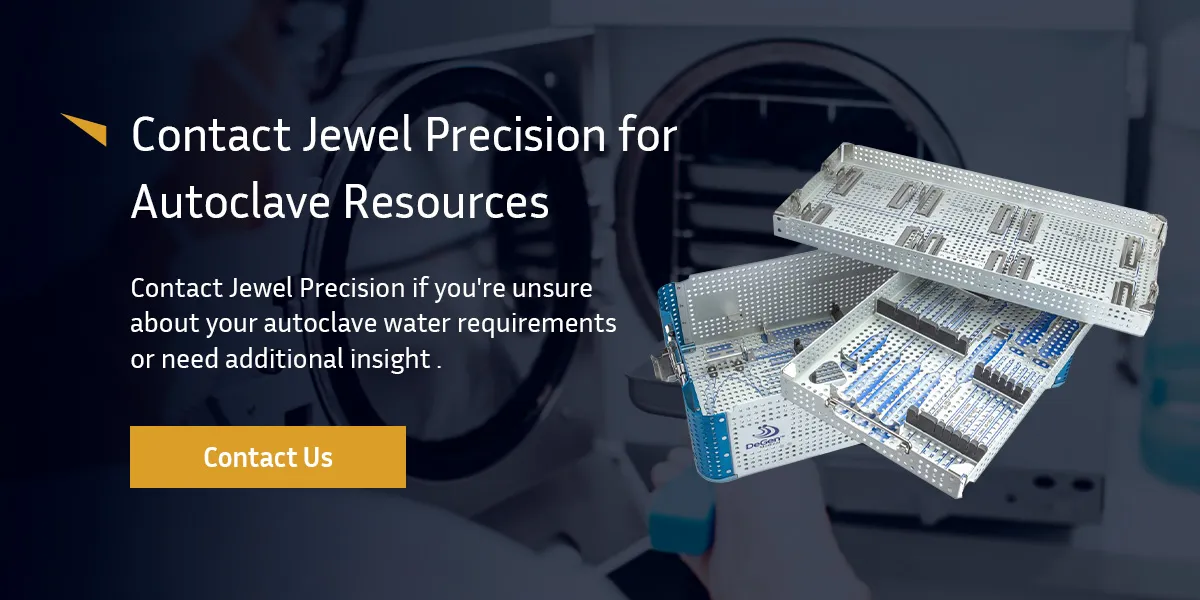Water quality is a key factor in ensuring the effectiveness and longevity of autoclaves. Autoclaves rely on steam to sterilize surgical instruments and equipment, so using the right water is important. If the water isn’t up to standard, it can impact the sterilization process and even damage the autoclave.
Proper sterilization is crucial to preventing infection and ensuring patient safety in industries such as health care, laboratories and dental offices. At Jewel Precision, we understand that protecting your medical implants and instruments is a top priority, so we’re here to provide valuable information on the water sterilization process and how it affects your equipment.
Can I Use Tap Water in My Autoclave?
It’s best to avoid using tap water in an autoclave. Most tap water contains minerals, chemicals and other impurities that vary significantly by region. Depending on your location, the water may have high levels of calcium, magnesium and chlorine present, and while it’s usually safe to drink, it is not ideal for autoclave use.
Using tap water in your autoclave can cause problems like mineral buildup, also known as scaling, on the internal components. This material can reduce heating efficiency and lead to expensive repairs. Additionally, chlorine and other disinfectants found in tap water can compromise sterilization and potentially corrode the autoclave’s internal parts.
Autoclave Water Sterilization Processes
There are a few ways to prepare water for autoclave use if distilled or deionized water is not available:
- Boiling: A simple method is to boil the water for at least 10 minutes and allow it to cool in a sterile container. This method is effective but requires careful handling to avoid re-contamination during cooling.
- Filtration system: Another option is to use a home or industrial-grade filtration system to remove impurities. Be sure to choose a system that effectively eliminates bacteria and minerals.
- Chemical sterilization: Sterilizing water through chemical means can be effective, but you must use chemicals that won’t leave harmful residues. Common chemicals include chlorine dioxide or iodine, and these should only be used following proper guidelines.
Can Water Contaminants Damage My Autoclave?
Contaminants such as the minerals present in hard water can leave scaling on your autoclave’s heating elements, reducing efficiency and causing longer cycle times. Bacteria and other microorganisms can also pose a risk, potentially compromising sterilization. Additionally, chemical contaminants, like certain cleaning agents or high levels of chlorine, can gradually corrode metal parts, reducing the life span of your equipment.
Over time, using contaminated water can lead to inefficient sterilization cycles and potential failures. The cost of repairs and maintenance due to water-related damage can add up quickly, making water quality a cost factor worth considering.
To prevent these issues, follow a regular maintenance schedule, including cleaning and descaling the autoclave as needed, and use only high-purity water. Installing a water treatment system in your facility, such as a reverse osmosis or deionization unit, can help ensure the water used meets the necessary quality standards.
Understanding Water Quality Standards for Autoclaves
Regulatory bodies like the International Organization for Standardization have established standards for water quality used in sterilization processes. These mandates outline acceptable levels of contaminants, including minerals, microorganisms and chemicals, to ensure the effectiveness and safety of autoclave operations.
Complying with these standards helps maintain effective sterilization and protects equipment from premature wear and tear, ultimately saving money on repairs and replacements in the long run.
Best Practices for Autoclave Water Management
Regularly check both your water source and the autoclave’s performance to ensure proper function. This practice includes monitoring water quality and ensuring that filters and treatment systems are operating correctly. Regular descaling and cleaning are crucial to avoid mineral buildup and corrosion.
Train your staff on proper water management practices, including how to test water quality, handle sterilized water and maintain the autoclave. Well-informed staff can help identify and address water quality issues before they become costly problems.
Contact Jewel Precision for Autoclave Resources
Using high-quality water for autoclave operations is essential for effective sterilization. Emphasizing best water preparation and maintenance practices can lead to more reliable autoclave performance and an extended equipment life span. We encourage you to conduct a water quality test in your facility and consult with a professional to ensure your operations meet the highest standards.
Contact Jewel Precision if you’re unsure about your autoclave water requirements or need additional insight on how to get the most out of your instrument sterilization and storage solutions. Our experts can provide tailored advice and custom products to optimize your sterilization processes and enhance the safety and efficiency of your operations.
